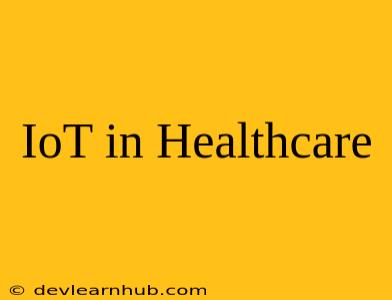Introduction
The Internet of Things (IoT) has emerged as a transformative force across various industries, and healthcare is no exception. By connecting medical devices, sensors, and other healthcare infrastructure to the internet, IoT is revolutionizing patient care, enhancing medical practices, and paving the way for a more efficient and personalized healthcare ecosystem. This article delves into the multifaceted impact of IoT in healthcare, exploring its applications, benefits, challenges, and future prospects.
Applications of IoT in Healthcare
Remote Patient Monitoring
IoT enables continuous and real-time monitoring of patients' vital signs, such as heart rate, blood pressure, and blood sugar levels. Wearable devices and implanted sensors transmit data to healthcare providers, allowing for early detection of health issues and timely interventions. This empowers patients to manage their conditions proactively and reduces the need for frequent hospital visits.
Smart Hospitals and Connected Healthcare Infrastructure
IoT is transforming hospitals into smart environments with interconnected devices and systems. Smart hospitals leverage sensors to optimize resource allocation, streamline workflows, and enhance patient safety. For instance, automated medication dispensing systems can reduce medication errors, while smart beds can monitor patient movements and alert staff to potential falls.
Personalized Medicine and Precision Healthcare
IoT facilitates personalized medicine by collecting comprehensive patient data, including genetic information, lifestyle habits, and environmental factors. This data enables healthcare providers to tailor treatment plans to individual patients, increasing treatment effectiveness and reducing adverse reactions.
Telemedicine and Virtual Care
IoT enables remote healthcare consultations and virtual care, expanding access to medical expertise for patients in underserved areas or with limited mobility. Telemedicine platforms powered by IoT connect patients with healthcare professionals via video conferencing, allowing for diagnosis, treatment recommendations, and remote monitoring.
Medical Device Connectivity and Integration
IoT enables seamless integration of medical devices, such as pacemakers, insulin pumps, and ventilators, with healthcare systems. This integration facilitates data sharing, remote device management, and real-time monitoring of patient conditions.
Benefits of IoT in Healthcare
Improved Patient Outcomes and Enhanced Quality of Care
IoT enables proactive patient management, early detection of health issues, and personalized treatment plans, leading to improved patient outcomes and enhanced quality of care.
Increased Efficiency and Cost Savings
By automating tasks, streamlining workflows, and reducing hospital readmissions, IoT contributes to increased efficiency and cost savings in the healthcare industry.
Enhanced Patient Engagement and Empowerment
IoT empowers patients to take an active role in their health management by providing them with access to real-time data and personalized insights.
Expanded Access to Healthcare
IoT enables telemedicine and virtual care, extending healthcare services to remote and underserved populations.
Data-Driven Insights and Analytics
IoT generates massive amounts of patient data, which can be analyzed to identify trends, predict health risks, and develop innovative treatment approaches.
Challenges of Implementing IoT in Healthcare
Data Security and Privacy
The sensitive nature of healthcare data necessitates robust security measures to protect patient privacy and prevent unauthorized access.
Interoperability and Standardization
Lack of interoperability between different medical devices and systems can hinder data sharing and integration, presenting challenges for seamless healthcare delivery.
Cost of Implementation
Implementing IoT solutions in healthcare can be expensive, requiring significant investment in infrastructure, software, and training.
Regulatory Compliance
IoT applications in healthcare must comply with stringent regulations to ensure patient safety and data integrity.
Technical Expertise
Implementing and managing IoT systems requires specialized technical expertise, which may be limited in some healthcare organizations.
Future of IoT in Healthcare
The future of IoT in healthcare holds immense potential for further advancements, including:
Artificial Intelligence (AI) and Machine Learning (ML)
AI and ML algorithms can analyze vast amounts of patient data to provide personalized insights, predict health risks, and develop innovative treatment strategies.
Wearable Technology and Personalized Health Monitoring
Advancements in wearable technology will enable more accurate and comprehensive monitoring of patients' health status, leading to better disease management and prevention.
Blockchain and Secure Data Sharing
Blockchain technology can enhance data security and privacy by creating an immutable and transparent record of patient data, facilitating secure data sharing between healthcare providers.
Remote Surgery and Robotics
IoT will enable remote surgery and robotic-assisted procedures, expanding access to specialized medical care and reducing surgical risks.
Conclusion
IoT is transforming healthcare by connecting medical devices, sensors, and healthcare infrastructure to the internet, enabling remote patient monitoring, personalized medicine, and smart hospitals. While challenges remain in data security, interoperability, and cost, the benefits of IoT in healthcare are significant, leading to improved patient outcomes, increased efficiency, and expanded access to care. As technology continues to evolve, the future of IoT in healthcare holds immense potential for further innovation and advancements, ultimately shaping a more efficient, personalized, and patient-centric healthcare ecosystem.
